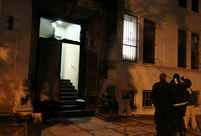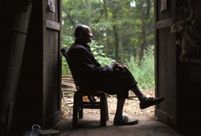 Famous Lanzhou beef noodles
Famous Lanzhou beef noodles Armed Police hold anti-terrorism drill in SE China's Xiamen
Armed Police hold anti-terrorism drill in SE China's Xiamen Harbin Int'l Ice and Snow Festival opens
Harbin Int'l Ice and Snow Festival opens 'Jin' named the word of the year by cross-strait netizens
'Jin' named the word of the year by cross-strait netizens Chinese scientific expedition goes to build new Antarctica station
Chinese scientific expedition goes to build new Antarctica station
 Chinese naval escort fleet conducts replenishment in Indian Ocean
Chinese naval escort fleet conducts replenishment in Indian Ocean 17th joint patrol of Mekong River to start
17th joint patrol of Mekong River to start China's moon rover, lander photograph each other
China's moon rover, lander photograph each otherLocal hospitals are reporting a big rise in numbers of patients with respiratory diseases — including H1N1 swine flu.
Tests in some hospitals found that many patients had this strain of flu, which in November became a seasonal flu type included in nationwide monitoring.
The Shanghai Center for Disease Control and Prevention said the epidemic of flu is stable in the city, but that Shanghai has entered the peak season for the bug with the arrival of cold fronts and smoggy days.
Among affected groups, many students hit by flu have been asking for sick leave.
Flu-related rumors are also circulating on social media platforms, with claims that H5N2 bird flu is coming.
The rumors say that those infected have similar symptoms to ordinary cold but with repeated fevers.
Rumormongers also warn parents not to take their children to public places and to stay away from live poultry to prevent H5N2.
But Dr Lu Hongzhou, director of the H7N9 expert group, said H5N2 is different from other avian flu viruses — such as H7N9 and H5N1 — as it doesn’t affect humans.
Xinhua Hospital said its out-patient and emergency services have been extremely busy in recent days.
The hospital created a record by providing out-patient and emergency services to 16,171 people on December 30.
Between January 1 and 7, the number of people visiting its out-patient and emergency services was up 37.7 percent on last year, while pediatric services at the hospital saw a 48 percent increase.
Dr Bai Jianwen, director of Shanghai East Hospital’s emergency department, said most patients have symptoms such as a headache, a sore throat, aches all over their body, high fever and a cough.
“Flu is different from an ordinary cold, which can be treated by drinking water and rest,” Bai said. “Flu symptoms only improve through professional treatment. If they don’t receive antibiotics, patients can develop bacterial infection three or four days later.”
Doctors said temperature fluctuations make people more susceptible to flu, while air pollutants can affect the immune system. People with a weak immune system are more likely to develop serious symptoms.
To reduce the chance of coming down with a winter bug, experts advise avoiding going to crowded places and washing your hands frequently.
 Chinese Consulate General in S.F. burned for arson attack
Chinese Consulate General in S.F. burned for arson attack Roar of J-15 fighter is melody for operator on the Liaoning
Roar of J-15 fighter is melody for operator on the Liaoning A 90-year-old forester's four decades
A 90-year-old forester's four decades Most touching moments in 2013
Most touching moments in 2013 2013: Joys and sorrows of world politicians
2013: Joys and sorrows of world politicians Missile destroyer Zhengzhou commissioned to Chinese navy
Missile destroyer Zhengzhou commissioned to Chinese navy China is technically ready to explore Mars
China is technically ready to explore Mars Photo story: Life changed by mobile technology
Photo story: Life changed by mobile technology Bullet train attendants' Christmas Eve
Bullet train attendants' Christmas Eve Heart-warming Laba porridge
Heart-warming Laba porridge Gallery: China's trapped icebreaker makes successful escape
Gallery: China's trapped icebreaker makes successful escape Photo story: We are special soldiers
Photo story: We are special soldiers 'Rong' selected HK's character of the year for 2014
'Rong' selected HK's character of the year for 2014 Famous Lanzhou beef noodles
Famous Lanzhou beef noodles Chinese Consulate Arson Suspect Makes 1st Court Appearance
Chinese Consulate Arson Suspect Makes 1st Court AppearanceDay|Week|Month